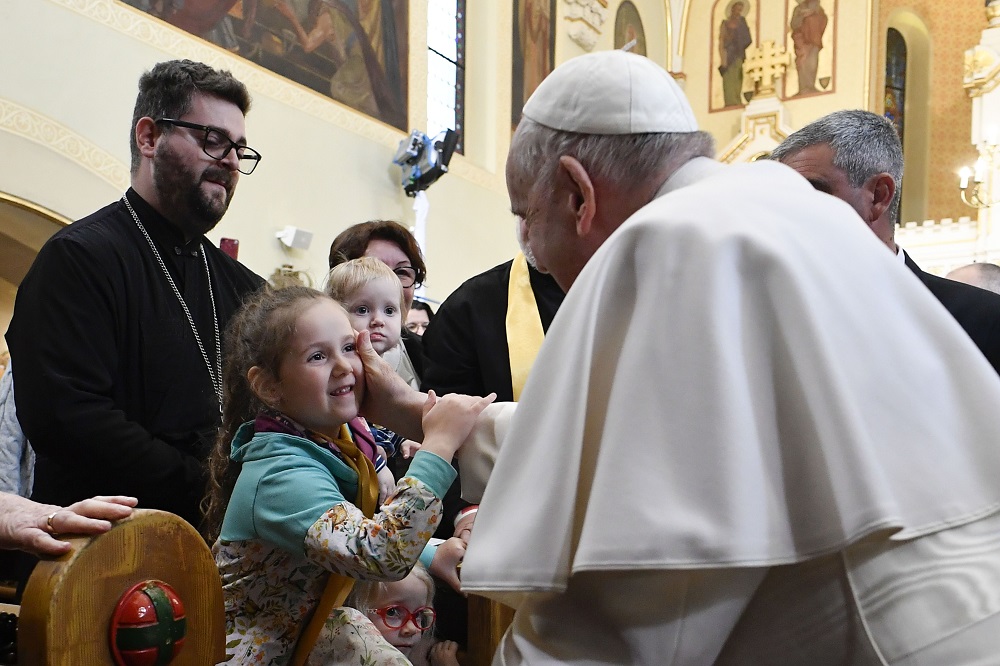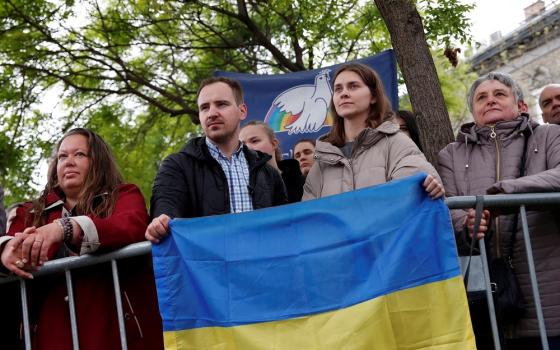Pope Francis greets about 100 children and young people who gathered outside the Church of St. Laszlo in Budapest, Hungary, to pray for Pope Francis April 29, 2023. (CNS/Vatican Media)
Pope Francis began his second day here in Hungary by thanking the country's Catholics for welcoming new arrivals following Russia's invasion of Ukraine, while reminding them that the Christian commitment of charity must also extend to non-believers.
"We need a church that is fluent in the language of charity, that universal language which everyone can hear and understand, even those farthest from us, even those who are not believers," the pope said on April 29.
Some 600 refugees, the majority of whom were Ukrainian, filled St. Elizabeth of Hungary Church in Budapest, along with an estimated 1,000 more awaiting the pope outside the church, where Francis heard firsthand testimonials from people who had recently fled war, along with those working with the country's poor and homeless.
Oleg Yakovlev, along with his wife and five children, told the pope that his family had resettled in Hungary after missiles struck his hometown of Dnipro, Ukraine.
"We didn't know where we would find a roof over our heads again," he said, before describing the support they had received from Catholic Charities. "Hungary was the beginning of a new life."
Thank you, he told the pope, "for standing up for the victims of the war."
Advertisement
Many of the young refugees sang for the pope and prepared art that greeted him upon his arrival. One child's drawing showed Francis standing between the Russian and Ukrainian flags with the word "peace" towering above the images.
During his remarks, the pope drew on the legacy of St. Elizabeth, the country's 13th-century saint who was the daughter of a king and who dedicated her vast wealth to caring for the poor and sick.
"Genuine faith is challenging," said Francis. "It takes risks, it leads us to encounter the poor and, by the witness of our lives, to speak the language of charity."
In a country that has historically been hostile to migration, especially non-Europeans, the pope paid tribute to the church for its immediate response to the more than 2 million refugees who have passed through the country since the war began in February 2022.
"Thank you too, for having welcomed — not only with generosity but also with enthusiasm — so many refugees from Ukraine," said Francis.
The pope then encouraged them to extend that commitment of hospitality to everyone in need — including the poor, the sick and the homeless — and to "take notice and choose not to remain indifferent" to those who are suffering.
"Charity is much more than material and social assistance," he said. "It has to do with the whole person; it strives to put people back on their feet with the love of Jesus: a love that helps them to recover their beauty and their dignity."

Pope Francis greets a family at the Eastern Catholic Protection of the Mother of God Church in Budapest, Hungary, April 29. (CNS /Vatican Media)
Francis began his three-day trip here on April 28 by offering a clarion call for those who claim to be Christians to open their borders and their hearts to refugees, presenting a direct challenge to the country's staunchly anti-immigrant and nationalist leaders, the overwhelming majority of whom are either Catholic or Calvinist.
"'I urge you to welcome strangers with benevolence and to hold them in esteem, so that they prefer to be with you rather than elsewhere,'" said the pope, quoting St. Stephen, the country's 10th-century king who spread Christianity in Hungary.
Ahead of Francis' arrival at the church, 33-year-old Olesia Misiats waited for the pope with her six-month old daughter in her arms, saying it was the chance of a lifetime to hear from the pope — a life that had recently been cruelly interrupted by war.
Misiats left her hometown of Kyiv with her mother and older daughter the day after the invasion began, not knowing at the time that she was pregnant.
Now, the child that was in her womb was alive in another country, never having set foot in her native Ukraine and was with her inside the church as she prepared to take solace in the pope's words.
While Misiats said the Hungarian people have been very welcoming, she is eager to one day return to Ukraine.
"I'm happy Europe opened the door for our people," she said, adding, "I want to go back home. It's my life."
Prior to the pope's meeting with refugees — which in addition to Ukrainians, included a handful of new arrivals from Afghanistan, Iraq, Syria and Africa — the pope privately visited a facility caring for some 70 young people with visual impairments and motor disabilities that Mother Teresa had visited in 1986.
Following his morning meetings, the Vatican announced that Francis had held a private meeting at the Vatican nunciature in Budapest with Metropolitan Hilarion of the Russian Orthodox Church. From 2009 to 2022, he served as Russian Orthodox Patriarch Kirill's head of external church relations, effectively the church's foreign minister. He was removed from that position in June 2022 after what is widely believed to be tensions with Kirill over his handling of the war in Ukraine.
The Vatican noted that the meeting was 20 minutes, but did not provide a read-out of the discussions between the two church leaders.
During the afternoon, Francis met with some 11,000 Hungarian young people, encouraging them to overcome selfishness and to work for the common good.
"This is the real challenge," said the pope: "To take control of our lives in order to help our world to live in peace."
"Each one of us should ask the uncomfortable question: What am I doing for others, for the church, for society? Do I think only about myself? Or do I put myself on the line for others, without calculating my own interests?," he asked.
"Let us reflect on our ability to be generous, our ability to love as Jesus taught us, which is by serving others," Francis told them.
The young people, often raucous and interrupting the pope with applause and cheers, presented the pope with a Rubik's cube, which was designed by a Hungarian architect in 1974.
Prior to departing for Rome April 30, Francis will preside over a large outdoor Mass here outside Hungary's Parliament, which is expected to draw thousands of Catholics from across the country.






